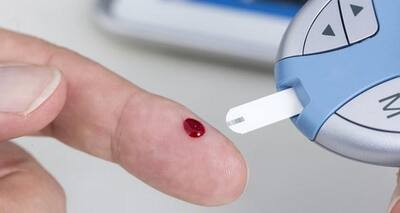Don’t Miss Out on the Latest Updates.
Subscribe to Our Newsletter Today!
Indian scientist: Anti-inflammatory protein may help treat type 1 diabetes

A study by an Indian origin scientist has revealed an anti-inflammatory small protein may be your answer to cure type 1 diabetes. This protein helps in maintaining a normal blood glucose level and the immune tolerance that aids in the treatment of type 1 diabetes. New research from Uppsala University reveals that the administration of interleukin-35, a protein made by immune cells, to mice with type 1 diabetes, reverses the disease. Read about diabetes-causes, symptoms and more.
Dr. Kailash Singh, a Ph.D. student at Uppsala University from Professor Stellan Sandler's research group, studied so-called immune regulatory T cells' actions in type one diabetes mouse models. The study shows that the immune regulatory T cells alter their function by producing pro-inflammatory destructive proteins instead of protective anti-inflammatory proteins such as interleukin-35 under type 1 diabetes conditions. Dr Singh said that this suggests that the good guys have gone bad in the early development of type 1 diabetes and therefore, our immune cells destroy the beta cell. Read: 10 celebrities living with diabetes.
Furthermore, the concentration of interleukin-35 was lower in type 1 diabetes patients compared to healthy individuals. These findings may suggest that interleukin-35 could play a crucial role in human type 1 condition. Additionally, the researchers also found a novel mechanism that explains how the immune regulatory T cells are changing their destiny under a type one diabetes condition. The team tested whether or not interleukin-35 could also suppress the development of type 1 diabetes and reverse established type 1 diabetes. Read tips to manage type 1 diabetes in children.
Also Read
To induce type 1 diabetes in mice, the team injected a chemical compound called streptozotocin. These mice developed signs of type 1 diabetes and increasing blood glucose levels similar as in human type 1 diabetes. Interleukin-35 injections that were given after disease induction prevented from the development of type 1 diabetes. Noticeably, Interleukin-35 injections to mice normalized blood glucose concentrations.
The research team also successfully investigated interleukin-35 in another model of type 1 diabetes called non-obese diabetic mouse (NOD). The interruption of interleukin-35 treatment did not result in the return of diabetes in any of the mouse models. Dr Singh said that they provided insight into a novel mechanism: how immune regulatory T cells change their fate under autoimmune conditions. Know more on exercise for diabetics.
Source: ANI
Image Source: Shutterstock


